Navigating the journey of a child with autism can feel like a rollercoaster ride for families. It’s not uncommon to feel overwhelmed as you search for effective strategies to support your child’s development. One approach that many families find helpful is ongoing Applied Behavior Analysis (ABA) therapy. This method offers tailored interventions that cater to the unique needs of each child, making it a valuable resource.
In this article, we’ll explore the many benefits of continuous ABA therapy. You’ll see how it can enhance life skills, improve social interactions, and foster independence and emotional well-being. But let’s be real—what challenges might families face in fully harnessing these benefits? And how can you navigate this complex landscape to ensure your child’s success?
Let’s explore this together! We’re here to help you every step of the way!
At Rori Care, we understand that navigating your child's journey can be challenging. That’s why our ABA Therapy employs a thorough evaluation process to craft personalized therapy plans that emphasize the benefits of ongoing ABA therapy for children with autism, tailored just for your family. Our dedicated clinicians dive deep into comprehensive evaluations, ensuring we address each individual’s unique needs.
This customized approach not only boosts involvement but also significantly enhances the benefits of ongoing ABA therapy for children with autism. Kids tend to respond better to interventions that resonate with their personal situations and learning styles. By equipping caregivers with ABA principles and emphasizing education, we align strategies that effectively support your child’s behavioral goals, showcasing the benefits of ongoing ABA therapy for children with autism.
Let’s explore this together! We’re here to help you every step of the way!
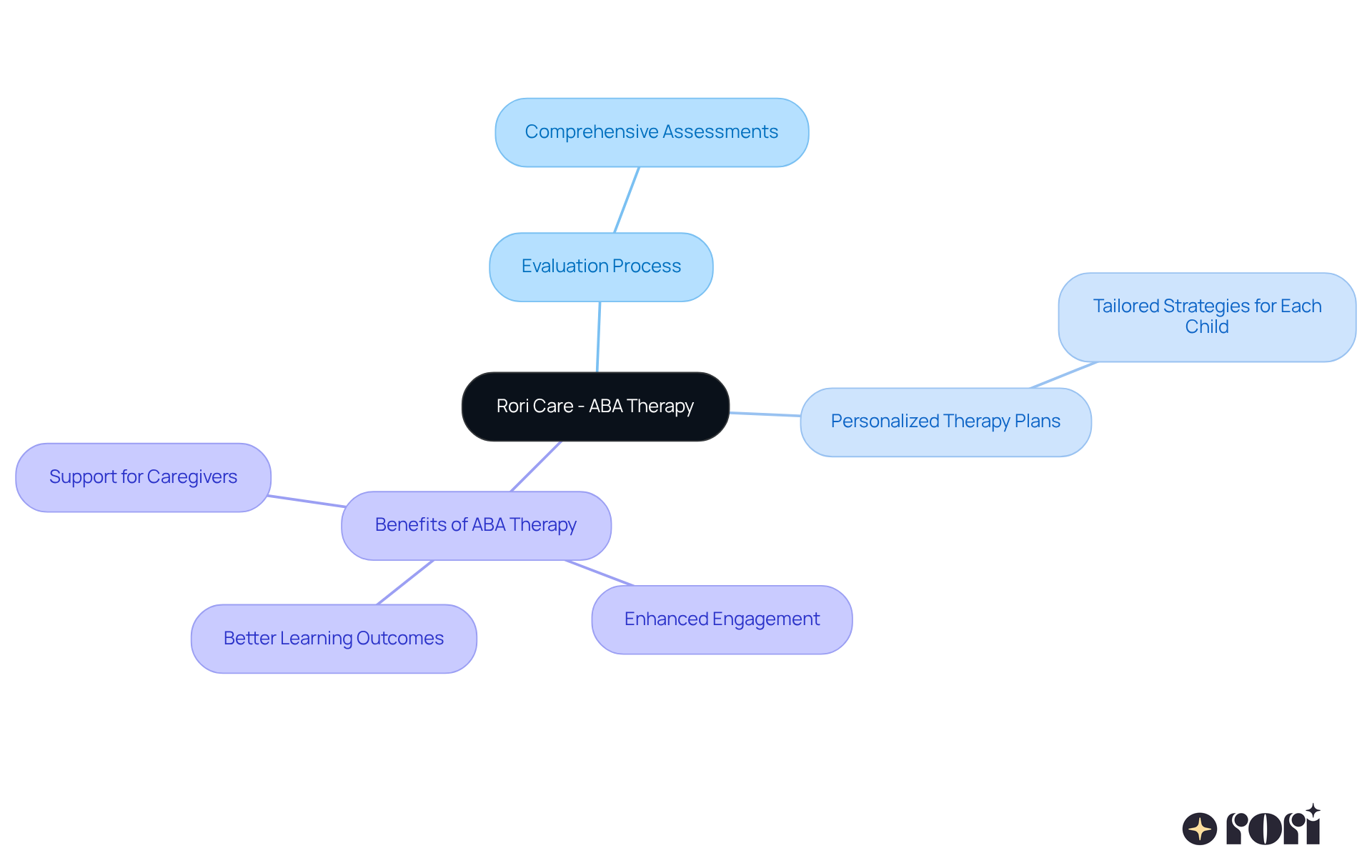
Continuous ABA therapy plays a vital role in helping young people with autism develop essential life skills that foster independence. At Rori Care, our dedicated behavior analysts craft personalized behavioral plans tailored to each child's unique needs, strengths, and goals. This ensures that every child receives the care that suits them best.
Through consistent practice and positive reinforcement, kids learn to tackle daily tasks, communicate better, and manage their emotions. We set clear, measurable goals for behavior change, giving families a transparent way to track progress. This gradual skill-building not only boosts their self-sufficiency but also significantly enhances their confidence, empowering them to navigate different environments with ease.
Research shows that children engaged in intensive ABA therapy—typically around 40 hours a week—often experience remarkable improvements in their social skills and adaptive behaviors. Behavior analysts emphasize that the effectiveness of ABA interventions hinges on factors like treatment intensity, family involvement, and the therapist's expertise, all of which contribute to fostering independence in children.
We keep a close eye on each child's progress and responsiveness to the therapy, making adjustments as needed to ensure the best outcomes. The long-term benefits of ongoing ABA therapy for children with autism are clear: individuals gain the crucial skills they need to thrive in their daily lives, paving the way for a more fulfilling and independent future.
Let’s explore this journey together! We’re here to help you every step of the way!
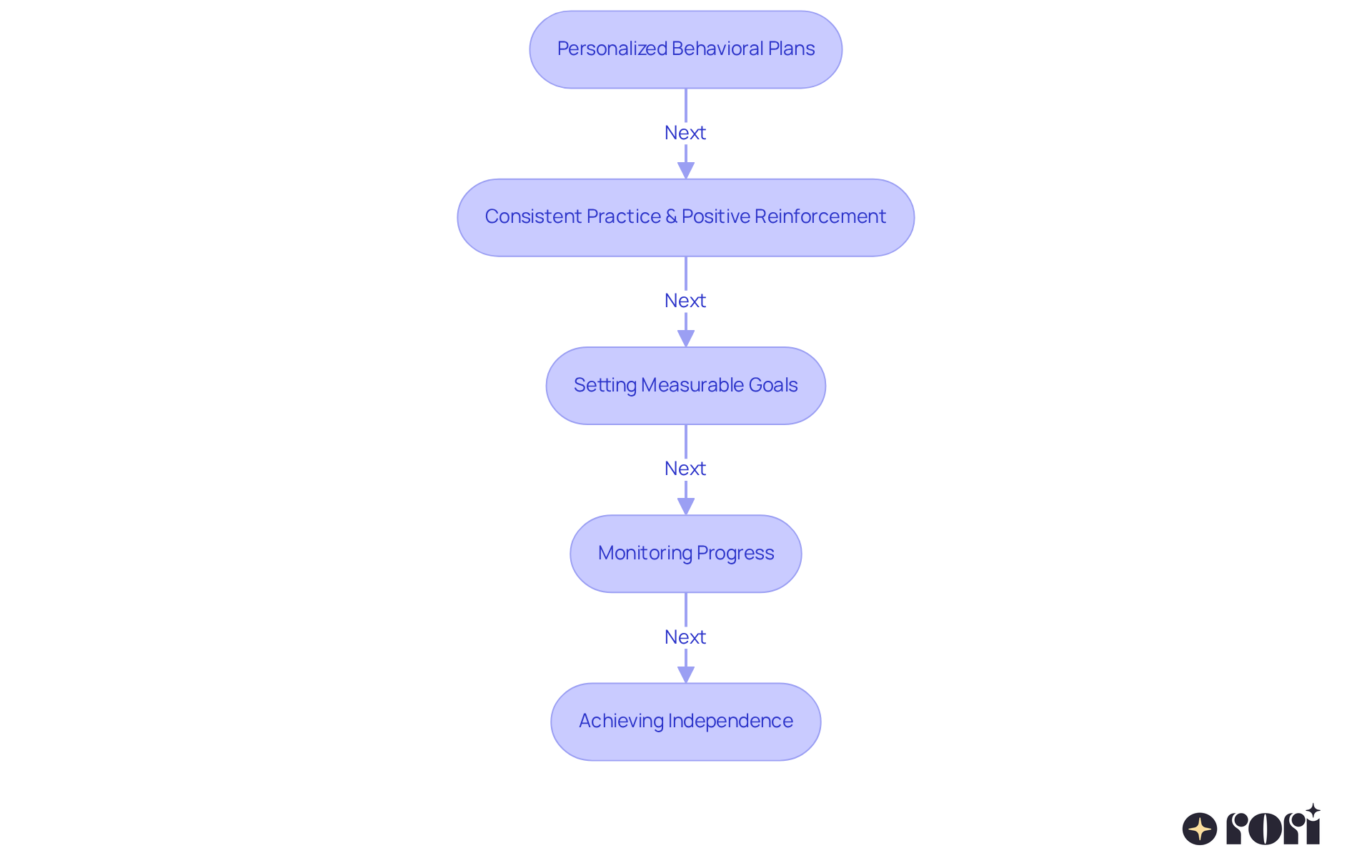
Consistent ABA support highlights the benefits of ongoing ABA therapy for children with autism in managing challenging behaviors. By using positive reinforcement techniques, therapists can really encourage the good behaviors while gently reducing the not-so-desirable ones. For instance, when a young person gets rewarded for finishing a task or joining in on social interactions, it strengthens those positive behaviors, making them more likely to happen again.
This approach doesn’t just lead to better behavior; it also helps individuals connect more positively with their peers and family. Families often find that their home feels more harmonious, which can really boost relationships and emotional ties. It’s heartening to see how effective positive reinforcement is in ABA treatment. Many practitioners highlight its crucial role in helping kids learn new skills and change behaviors.
When children are in a structured and supportive therapeutic environment, they can truly thrive. It’s amazing to witness the profound impact that the benefits of ongoing ABA therapy for children with autism have on their overall development. Plus, as caregivers learn more about ABA principles, they become better equipped to provide the right support at home. This not only reduces stress but also improves family dynamics.
Empowered caregivers play a vital role in reinforcing what kids learn and helping them apply those skills outside of therapy sessions. Let’s explore this together! We’re here to help you every step of the way!
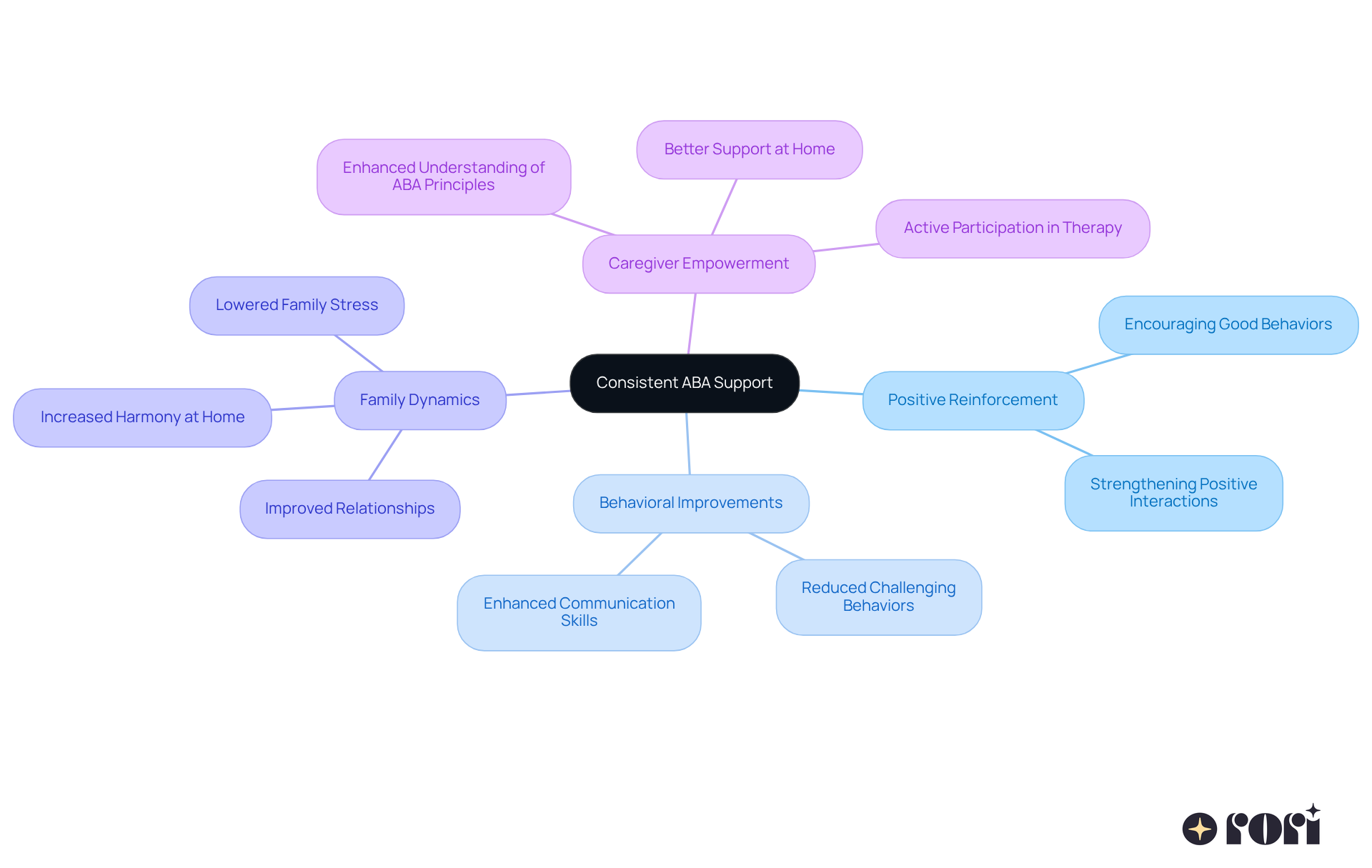
Family engagement is essential for realizing the benefits of ongoing aba therapy for children with autism! At Rori Care - ABA Support, we really encourage parents to get involved in their child’s sessions. We provide useful tools and strategies that help enhance learning right at home. This teamwork not only strengthens the bond between parent and child but also ensures that the skills learned during sessions are applied in everyday life.
You know, studies show that kids make faster progress when parents actively support the benefits of ongoing aba therapy for children with autism. It leads to better outcomes! One parent shared, "When parents aren’t engaged in the process, it creates a disconnect between the treatment room and what occurs in the young one’s home." This really highlights how crucial parental involvement is in understanding the benefits of ongoing aba therapy for children with autism in bridging the gap between treatment and daily life.
Plus, effective parent-led ABA interventions demonstrate the benefits of ongoing ABA therapy for children with autism, as they show that when parents feel empowered to engage actively, they experience less stress and enjoy better family dynamics. This not only helps kids reach their goals more quickly but also fosters independence and confidence. By embracing their role as partners in the healing journey, parents can truly make a difference in their child’s development and overall well-being.
Let’s explore this together! Your involvement can be a game-changer!

At Rori Care, we understand that navigating the world of ABA therapy can be a challenge for parents. That’s why we’re excited to share how our approach leverages the power of AI to make a real difference! Imagine being able to track your child’s progress in real-time. With advanced data analytics, our therapists can quickly adjust treatment plans to fit your child’s unique needs.
This tech-savvy strategy not only tailors interventions but also keeps them flexible as your child grows and changes. Plus, our behavior care engine takes care of generating progress reports, which means therapists can spend 50% more time engaging with your child. Isn’t that fantastic?
By embracing this advanced technology, we’re highlighting just how important data-driven approaches are in improving treatment outcomes. Our goal is to promote the benefits of ongoing ABA therapy for children with autism by enhancing communication, social skills, and adaptive behaviors. Let’s explore this journey together! We’re here to help you every step of the way!
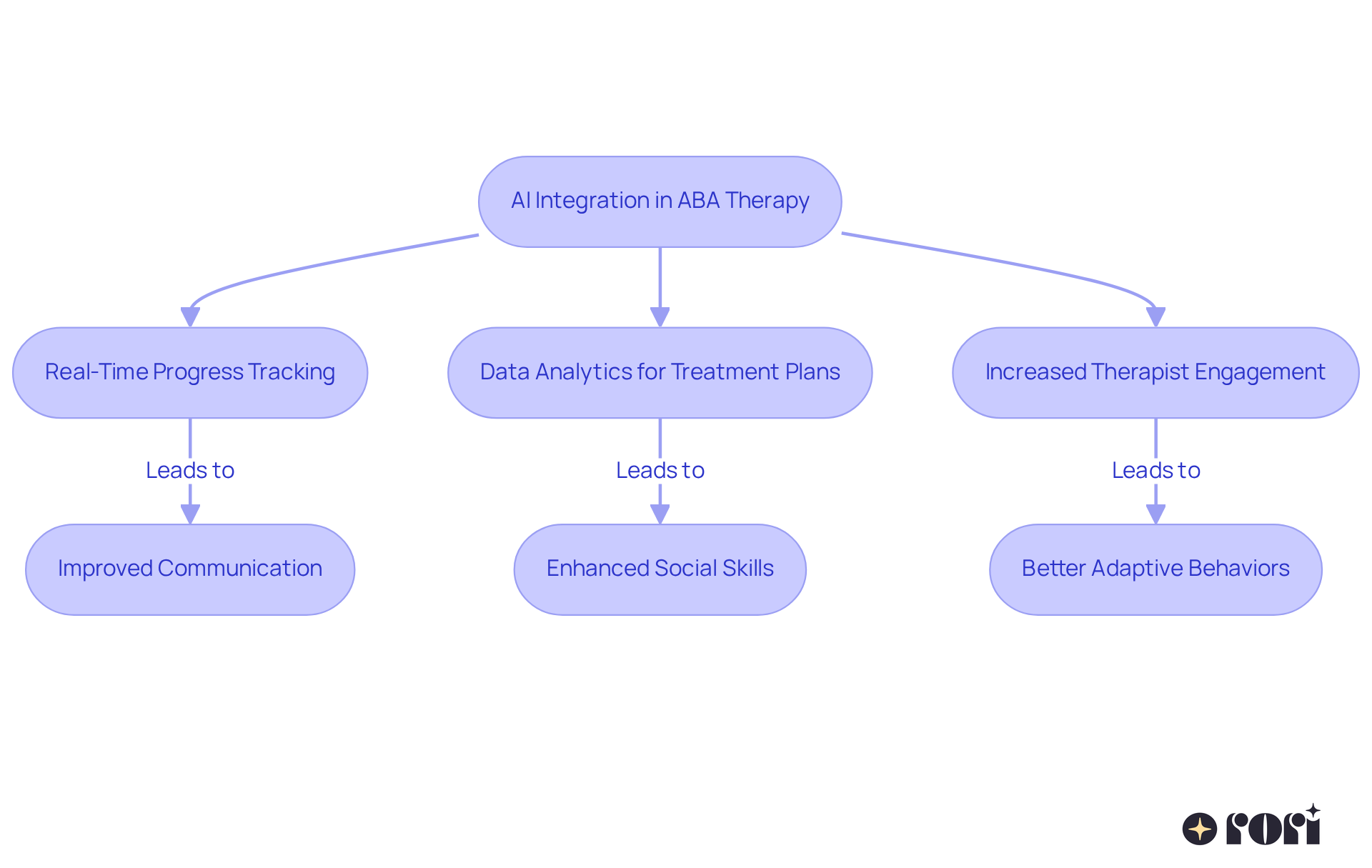
The benefits of ongoing ABA therapy for children with autism make it a game-changer for young individuals, especially in improving their social skills. At Rori Care, our clinical leadership team is all about embracing neurodiversity and empowering caregivers with practical ABA principles and strategies. Through fun activities and role-playing scenarios, kids learn how to navigate social interactions, pick up on social cues, and build meaningful relationships.
This focus on social skills not only helps them connect with their peers but also boosts their emotional well-being and confidence. Research shows that the benefits of ongoing ABA therapy for children with autism include impressive strides in communication, social initiation, and peer interactions. For instance, a study with 100 boys aged 4 to 11 found significant improvements in social skills after just 16 hours of targeted ABA training. That really highlights the benefits of ongoing ABA therapy for children with autism and the impact this intervention can have!
Plus, ongoing progress assessments and data collection are key parts that highlight the benefits of ongoing ABA therapy for children with autism. They ensure that the interventions are effective and tailored to each child's evolving needs. At Rori Care, the teamwork between therapists, families, and educators creates an inclusive environment that supports the social integration of youth with autism. This collaboration leads to positive outcomes in their social interactions.
As one of our therapists beautifully put it, "The personalized approach of ABA helps us tackle each child's unique challenges, fostering their social growth in meaningful ways." So, let’s explore this journey together! We’re here to help you every step of the way!

When it comes to ABA treatment, data-driven insights play a crucial role in ensuring success. A qualified behavior analyst crafts personalized plans that include measurable objectives and evidence-based strategies, tailoring interventions to meet each individual’s unique needs. By continuously gathering and examining data, we can uncover behavioral patterns and trends that guide decision-making, making treatments even more effective.
Evidence-based practice (EBP) is key here, as it ensures that interventions are rooted in scientific research. For instance, studies show the benefits of ongoing ABA therapy for children with autism, as those who receive consistent interventions often make remarkable strides in communication, social skills, and adaptive behaviors. In fact, there's a standardized mean difference of d=-0.36 for autism symptoms and d=0.30 for communication! Isn’t that encouraging?
Behavior analysts emphasize the importance of personalized treatment plans grounded in systematic data analysis, leading to better outcomes. A meta-analysis highlighted that starting early interventions around 3.81 years old can offer significant benefits of ongoing ABA therapy for children with autism. This really underscores the need for ongoing assessment and adjustments in autism treatment to fully realize the benefits of ongoing ABA therapy for children with autism.
By harnessing these insights and leveraging advancements in technology that improve data collection accuracy, therapists can ensure that every individual receives the precise support they need to thrive. Let’s explore this together! We’re here to help you every step of the way!
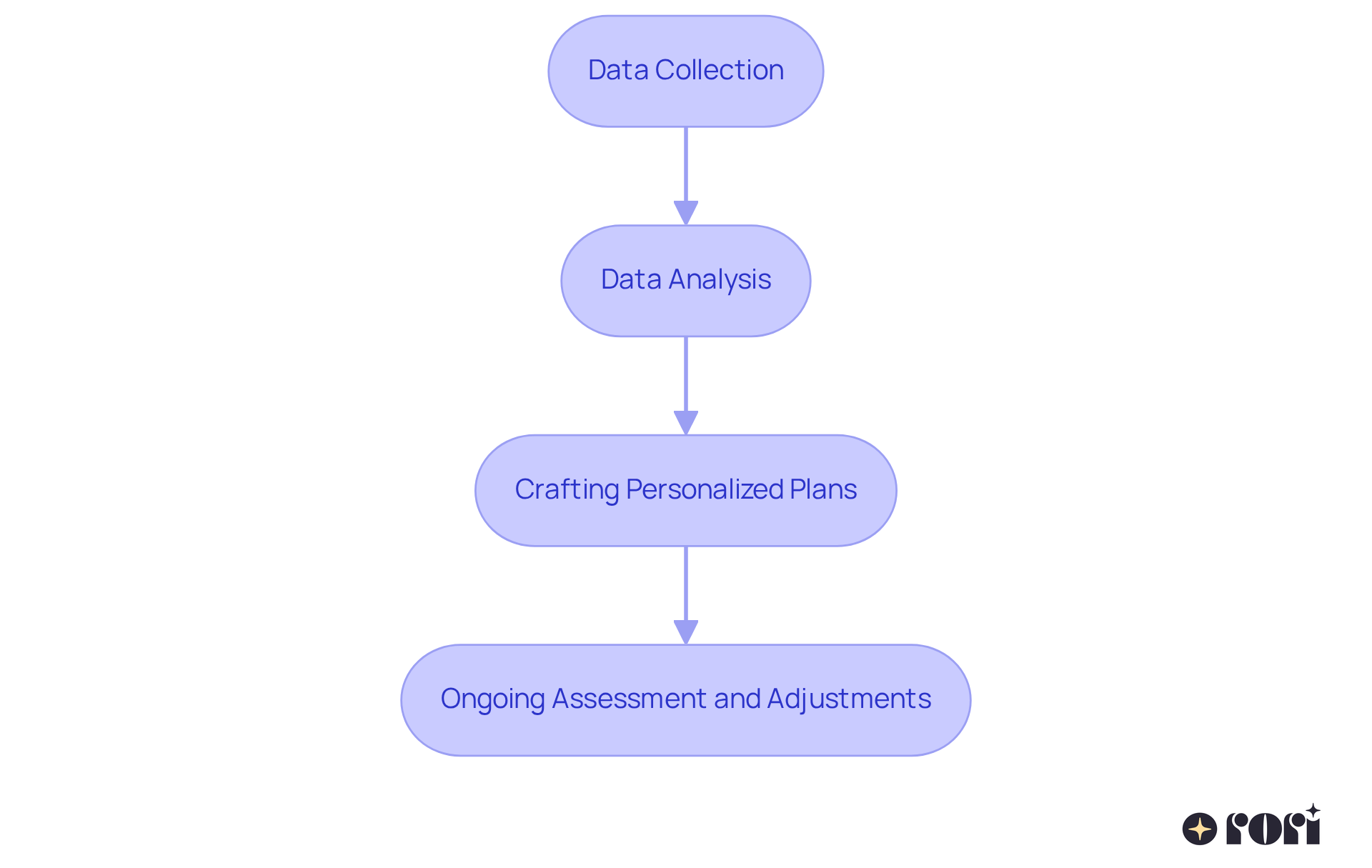
The benefits of ongoing ABA therapy for children with autism are truly game-changing when it comes to helping kids achieve academically! It really strengthens those essential learning skills like attention, organization, and problem-solving. When ABA methods are integrated into learning environments, the benefits of ongoing ABA therapy for children with autism help them build the skills they need to thrive in school.
For example, educators often highlight how clear and consistent routines create a predictable space for students. This predictability can really help reduce anxiety and boost focus. Plus, techniques like positive reinforcement and structured play not only keep students engaged but also help them develop self-regulation and confidence in their abilities.
And let’s not forget about the role of caregivers! When they learn about ABA principles and strategies, they’re better equipped to support their kids at home. This kind of informed decision-making allows parents to actively participate in their child’s learning journey, leading to better behavioral outcomes and empowering them in their caregiving roles.
As one educator beautifully put it, 'By incorporating ABA techniques into routines and academic tasks, students have more opportunities to practice and apply newly acquired abilities across various contexts.' This kind of comprehensive support enriches their learning experience and prepares them for future educational challenges, nurturing a lifelong love of learning.
Additionally, studies show that young individuals who undergo intensive ABA treatment often experience the benefits of ongoing ABA therapy for children with autism, making significant strides in communication and adaptive skills that help them fit right into mainstream classrooms. Ultimately, bringing ABA methods into educational settings not only supports individuals with autism but also demonstrates the benefits of ongoing ABA therapy for children with autism, creating a warm and inclusive atmosphere for all students.
Let’s explore this together! If you’re curious about how ABA can make a difference, we’re here to help you every step of the way!
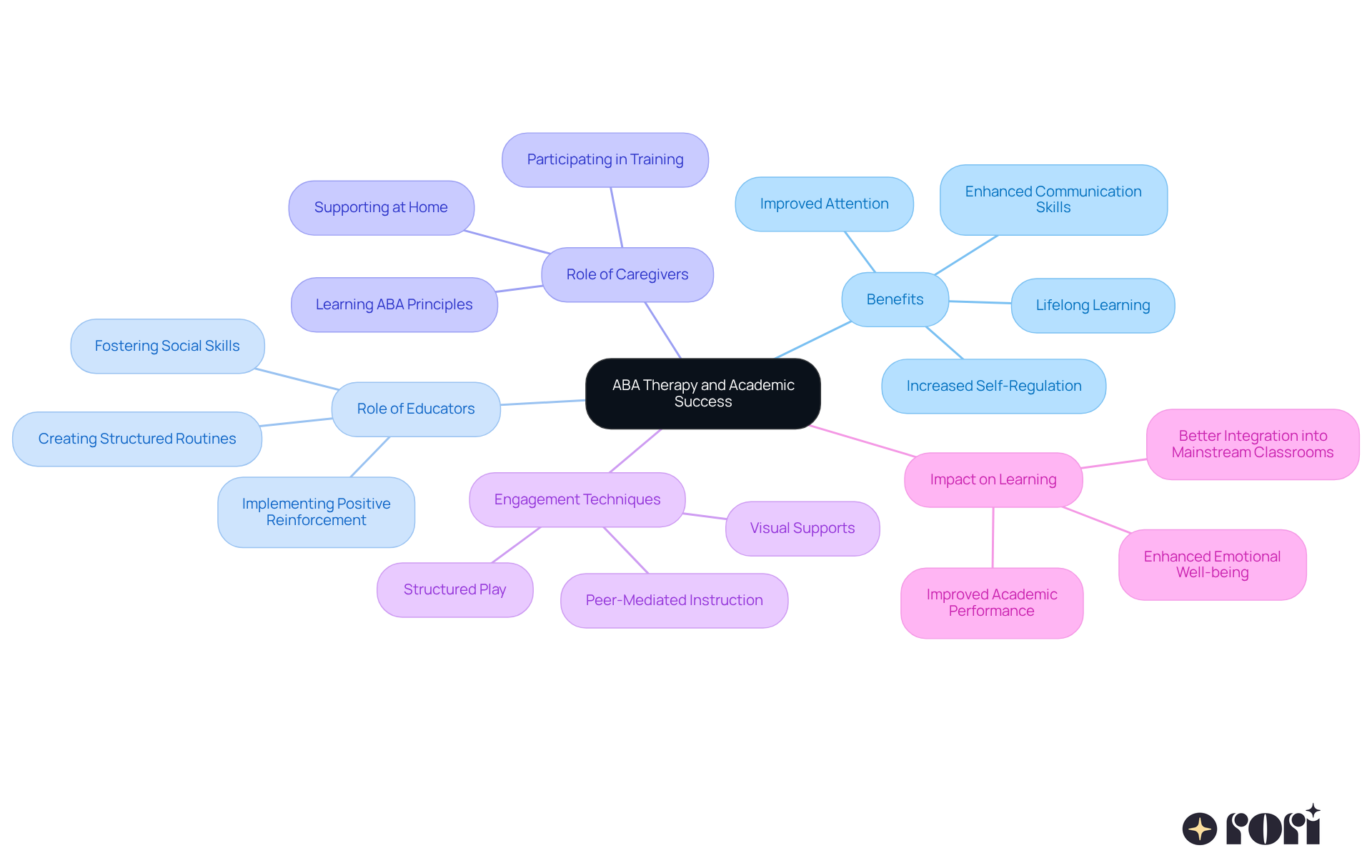
ABA intervention is a game changer for reducing anxiety symptoms in kids with autism. Its patient-centered and flexible approach really makes a difference! By using techniques like gradual exposure and positive reinforcement, therapists help young individuals build essential coping strategies to tackle their anxiety head-on. Visual aids, such as emotion thermometers and picture schedules, are also part of the mix, making it easier for kids to recognize and manage their feelings. This focus on emotional regulation creates a calmer environment, allowing them to face challenges with newfound confidence.
And let’s not forget about parental involvement! It’s crucial for reinforcing these coping strategies at home, ensuring that kids have consistent support in managing their anxiety. When parents get involved, young individuals often see a significant boost in their overall quality of life. These effective coping techniques not only help with anxiety but also enhance problem-solving skills, build resilience, and encourage social interactions. Through structured approaches like breathing exercises and the STOP-THINK-ACT model, kids learn to identify their anxiety triggers and apply calming techniques, leading to better emotional regulation in various situations.
Research shows that the benefits of ongoing ABA therapy for children with autism include an impressive success rate of over 89% in addressing autism spectrum disorder. This highlights its effectiveness in alleviating anxiety symptoms while improving learning, verbal, and social skills. The benefits of ongoing ABA therapy for children with autism highlight its adaptability and focus on personal growth, making it a vital resource for supporting young individuals with autism, ADHD, and other social communication challenges. Let’s explore this together and see how we can make a positive impact!
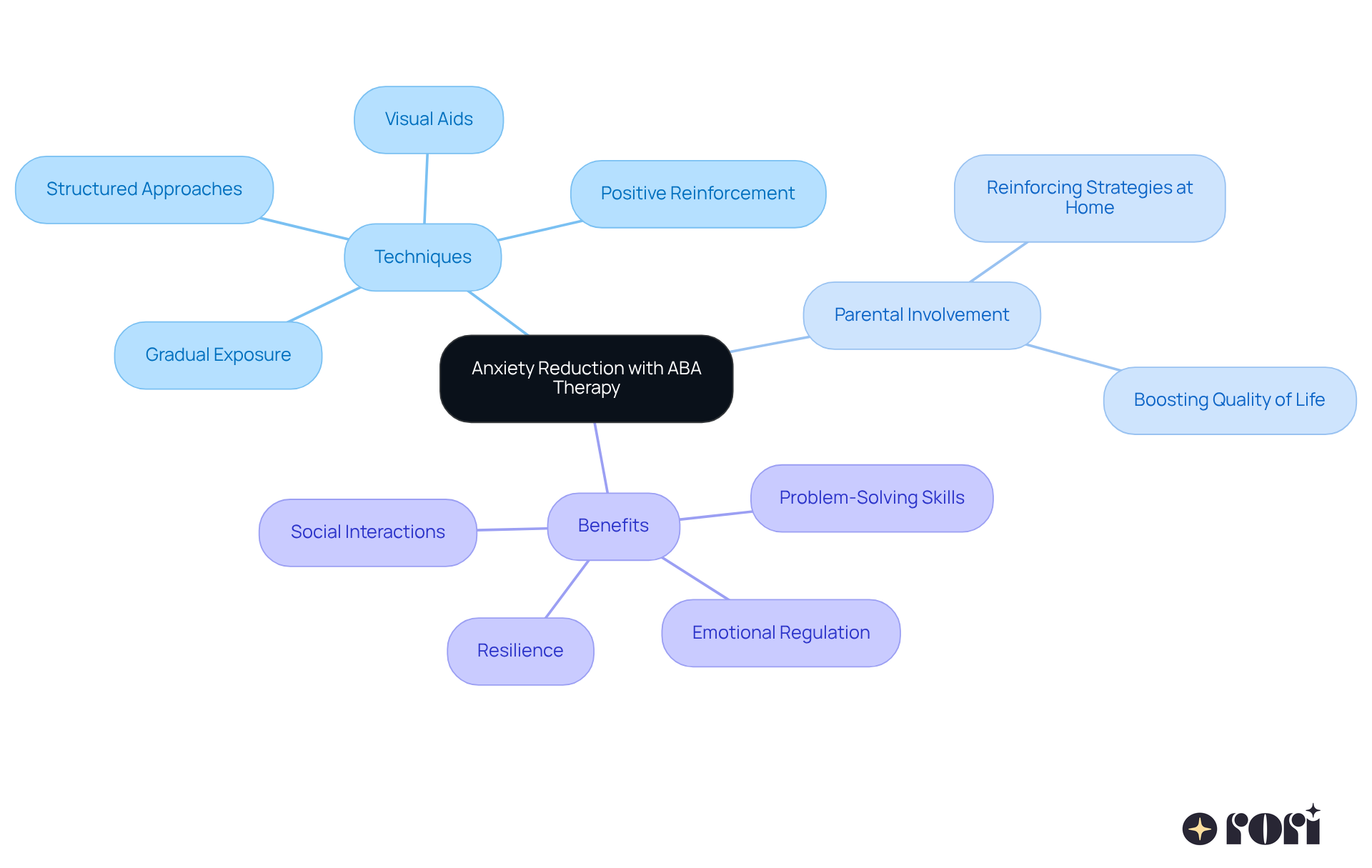
Continuous ABA treatment can truly demonstrate the benefits of ongoing ABA therapy for children with autism! It tackles various challenges and promotes overall well-being. By focusing on communication, social skills, and emotional regulation, ABA helps children gain the tools they need to thrive in everyday life. This holistic approach not only boosts their personal skills but also creates a nurturing environment where they can flourish socially and emotionally.
Many clinicians have observed that kids undergoing ABA therapy often experience significant improvements in how they interact with peers, express their needs, and manage their emotions. This leads to a more fulfilling and independent life. Research shows that ABA therapy boasts an impressive success rate of over 89% for individuals with ASD, with numerous studies highlighting positive impacts on communication and cognitive skills.
At Rori Care - ABA Therapy, we’re excited to enhance this process by using AI to automate progress report writing. This innovation frees up 50% more time for direct treatment, allowing caregivers to focus on what truly matters. It empowers them with the principles and strategies of ABA, enabling them to actively support their loved ones' behavioral goals through informed decision-making and data collection.
With the demand for ABA therapy projected to rise by about 22% in the coming years, it’s clear that the benefits of ongoing ABA therapy for children with autism are essential for their support and intervention. Let’s explore this journey together! We’re here to help you every step of the way!
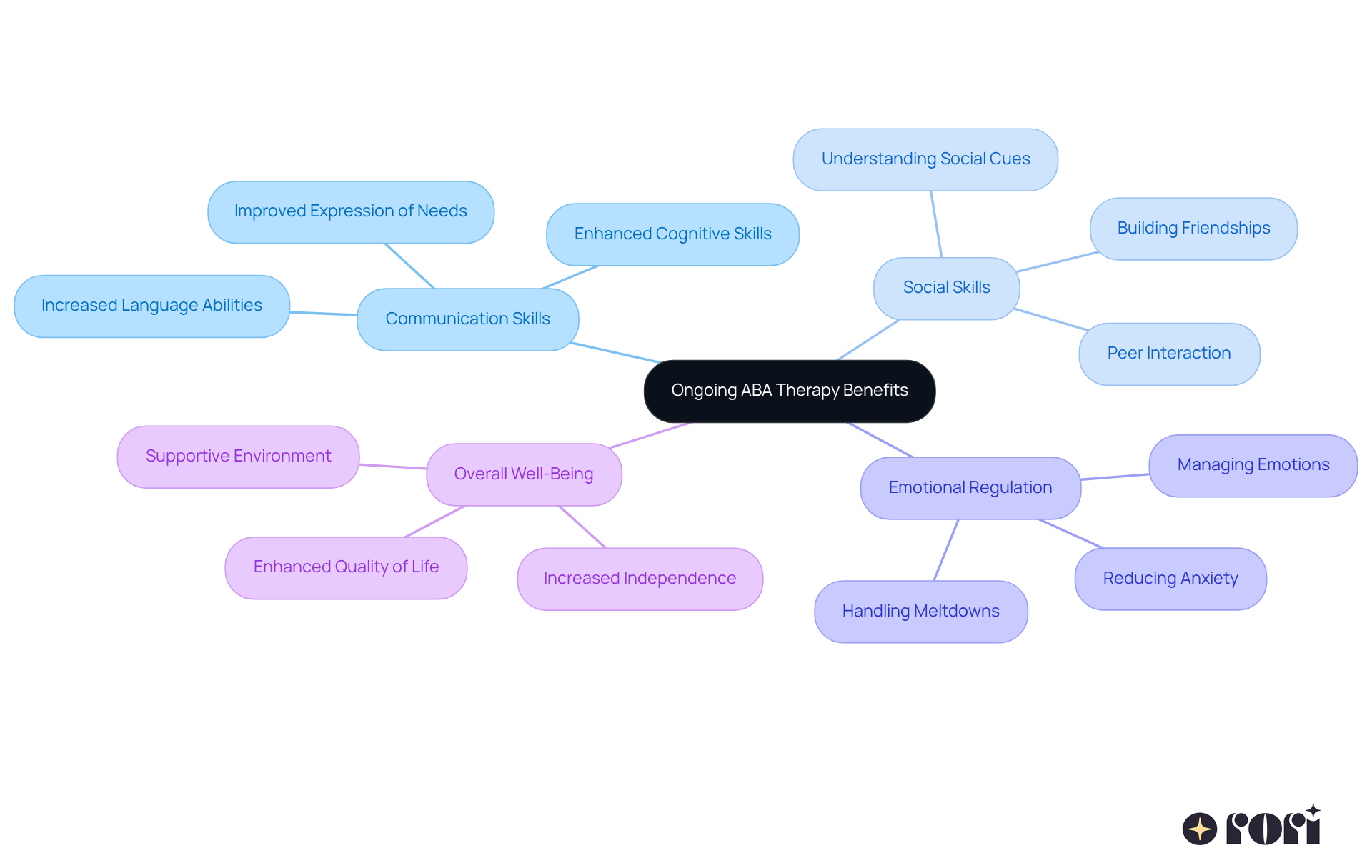
The ongoing benefits of ABA therapy for children with autism really highlight how crucial personalized and continuous support is in their developmental journey. When families use tailored treatment plans, they often see significant improvements in their children's skills, behaviors, and overall quality of life. This holistic approach not only nurtures independence but also helps kids develop essential life skills that empower them to thrive in different environments.
Key insights from the article show how consistent ABA therapy boosts skill development, reduces challenging behaviors, and encourages social interaction. Plus, when parents get involved and technology is integrated, these benefits grow even more, creating a supportive framework that connects therapy with real-life situations. Continuous assessment and data-driven strategies make sure that interventions stay effective and responsive to each child's unique needs.
Ultimately, embracing all the advantages of ABA therapy is vital for maximizing the potential of children with autism. Families are encouraged to actively engage in this transformative process, reinforcing the skills learned in therapy and creating a nurturing environment at home. By prioritizing ongoing ABA therapy, caregivers can significantly enhance their children's experiences, paving the way for a fulfilling and independent future. Let’s explore this journey together!
What is Rori Care's approach to ABA therapy for children with autism?
Rori Care employs a thorough evaluation process to create personalized therapy plans that cater to each child's unique needs, emphasizing the benefits of ongoing ABA therapy.
How does Rori Care ensure the therapy plans are effective?
Dedicated clinicians conduct comprehensive evaluations to tailor interventions to each child's personal situation and learning style, which enhances their engagement and the effectiveness of the therapy.
What role does skill development play in ABA therapy at Rori Care?
Continuous ABA therapy helps children develop essential life skills that foster independence, with personalized behavioral plans crafted by behavior analysts to suit each child's strengths and goals.
How does Rori Care track progress in ABA therapy?
Clear, measurable goals for behavior change are set, allowing families to transparently track their child's progress and make necessary adjustments to the therapy.
What are the benefits of intensive ABA therapy?
Research indicates that children engaged in intensive ABA therapy—around 40 hours a week—often experience significant improvements in social skills and adaptive behaviors.
How does ABA therapy help reduce challenging behaviors?
Consistent ABA support uses positive reinforcement techniques to encourage desirable behaviors while gently reducing challenging ones, leading to improved interactions with peers and family.
What impact does ABA therapy have on family dynamics?
As caregivers learn ABA principles and apply them at home, it reduces stress and improves family relationships, creating a more harmonious environment.
How do caregivers contribute to their child's success in ABA therapy?
Empowered caregivers reinforce the skills learned in therapy sessions and help children apply those skills in everyday situations, enhancing the overall effectiveness of the therapy.